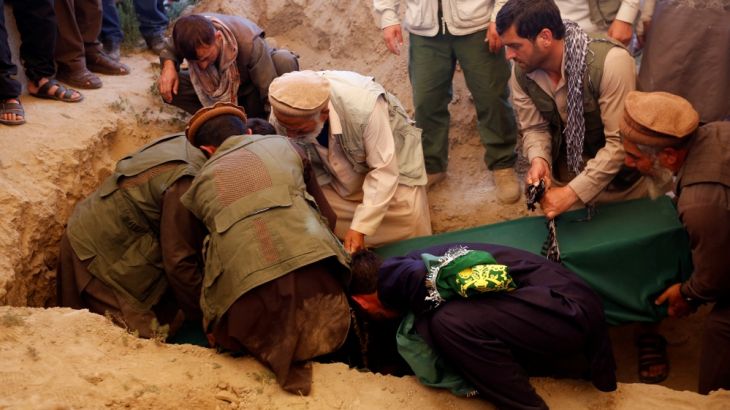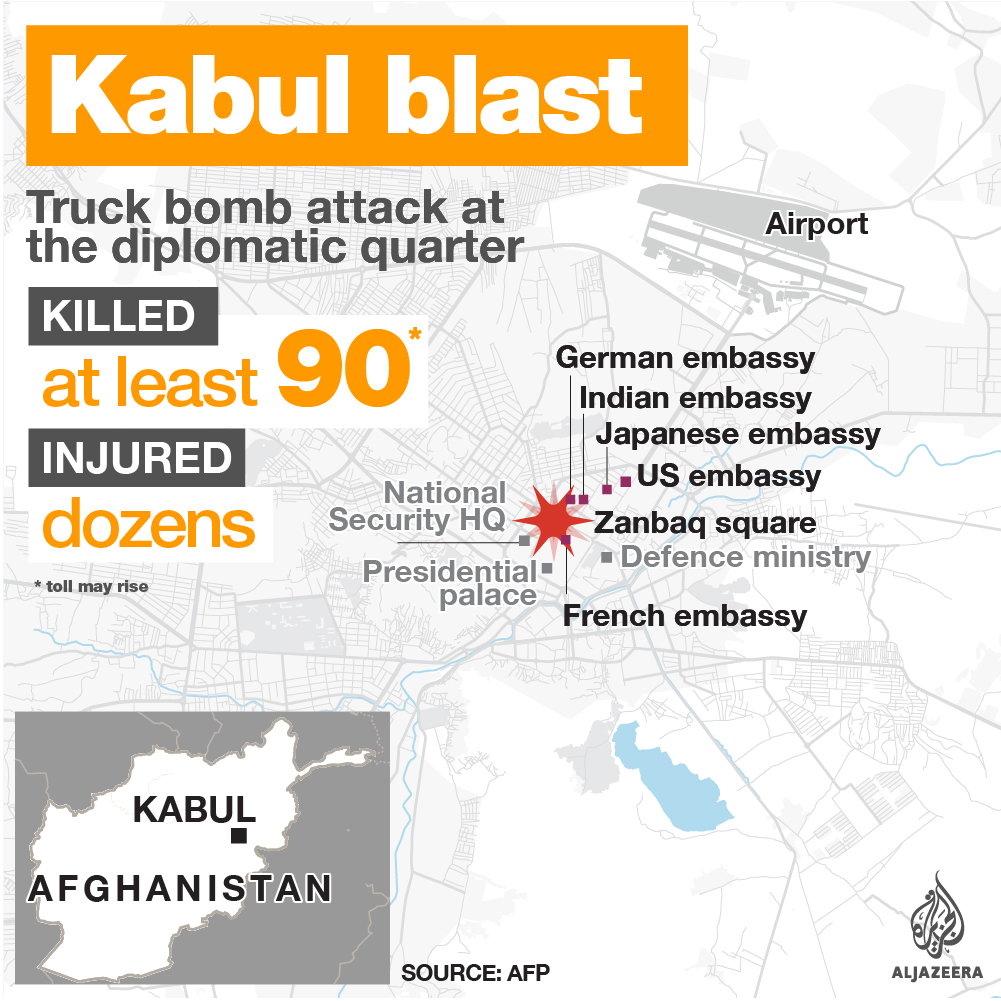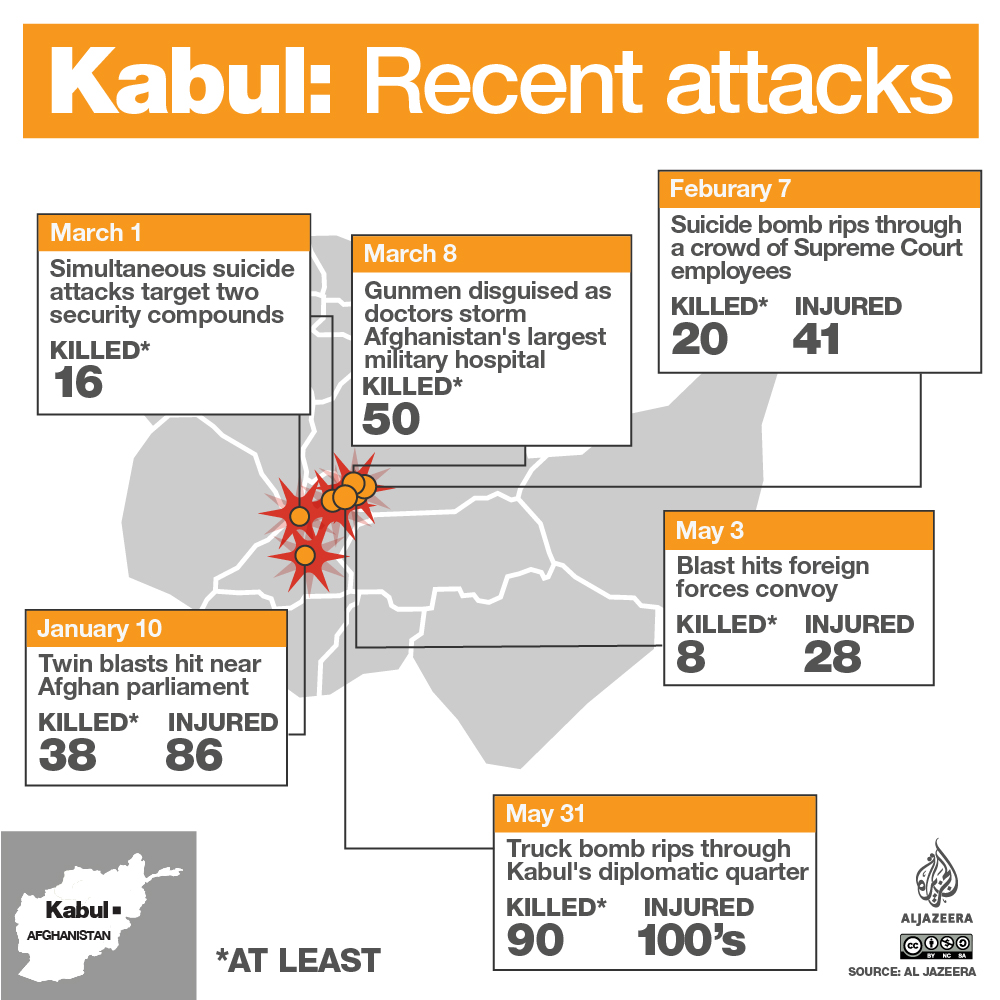Afghanistan blames Pakistan and Taliban for Kabul blast
Pakistan rejects claim its intelligence services helped Taliban-affiliated Haqqani network to carry out deadly bombing.

A war of words continues between Afghanistan and Pakistan after a deadly suicide attack in Kabul left at least 90 people dead.
Afghan intelligence officials have blamed a Taliban-affiliated group and Pakistan for Wednesday’s truck bombing in Kabul’s diplomatic quarter.
Keep reading
list of 4 itemsPhotos: Tourist numbers up in post-war Afghanistan
Taliban ban on girls’ education defies both worldly and religious logic
Afghanistan calls for ‘respect’ after Cricket Australia snub
Pakistani officials have rejected the accusations, and Taliban officials have said they had no hand in the blast.
Al Jazeera’s Zein Basravi, reporting from Islamabad, said Afghanistan’s accusations on Thursday were part of an ongoing “war of words” between the two countries.
|
|
It is “a signal of the distrust that is affecting both their bilateral relationship and also more cooperation on counterterror issues”, he said.
At least 400 others were injured when a suicide attacker drove a tanker truck laden with explosives into Kabul’s heavily guarded diplomatic district during morning rush hour.
The Afghan intelligence service said on Wednesday that early findings showed the Taliban-allied Haqqani network had carried out the attack with the assistance of Pakistani intelligence services.
“The plan for today’s [Wednesday’s] attack was drawn up by the Haqqani network with direct coordination and cooperation from Pakistan’s Inter Services Intelligence (ISI),” the National Directorate of Security said in a statement.
Afghanistan has long accused Pakistan of supporting and sheltering Haqqani and Taliban commanders and fighters, and the two countries regularly accuse each other of supporting armed groups operating across the border.
Zabihullah Mujahid, a spokesman for the Taliban, told Al Jazeera that the group was not involved in the attack.
READ MORE: Kabul in mourning after blast kills almost 100 people
The explosion was the city’s worst attack since the withdrawal of foreign forces from Afghanistan 2014.
Most of the casualties were civilians, including women and children, but the dead also included Afghan security guards.
Kabul’s acting mayor said the explosion damaged property as far as 4km away from the blast site and that scores of people were waiting in hospitals to learn the status of wounded family and friends.
Accusing finger
In a phone call with US President Donald Trump on Wednesday, Afghan President Ashraf Ghani complained about the role of Pakistani intelligence services in the attack as well as the role of the Pakistani intelligence service in the ongoing conflict in Afghanistan, sources inside the presidential palace told Al Jazeera.
Pakistan’s foreign office in Islamabad issued a statement just hours after Wednesday’s explosion, condemning the attack, saying that its own people were in the area and were among those affected by the blast.

On Thursday, Pakistan reiterated its condemnation and called the “accusatory approach … unhelpful towards efforts for peace”.
“We reject the Afghan allegations,” said Nafees Zakaria, Pakistan’s foreign affairs spokesman.
“Pakistan has suffered from the menace of terrorism, and I think we have made unparalleled sacrifices in the war against terrorism. Pakistan has the highest stakes in the peace and stability in Afghanistan. I think no other country gets affected like Pakistan when anything happens in Afghanistan.”
|
|
Michael Semple, a visiting professor at the centre for Conflict Transformation and Social Justice at Belfast’s Queens University, told Al Jazeera that the accusation was “eminently plausible”.
“The Haqqani Network, who the Afghan government have now named, are not just Taliban-affiliated, they are an integral part of the Taliban movement,” he said.
“Sarash Haqqani, the head of that network, is the deputy of the Taliban movement.”
Semple said the Haqqani network has routinely published videos after attacks it considered “successful”, showing how the group planned, trained personnel and carried them out.
“However, also we’ve seen a pattern that when there are high civilian casualties, particularly if they’re unintended and something’s gone wrong, the Taliban routinely put out a denial, even if the attack has all the hallmarks of their work.
“I think this is what we’re seeing now, from yesterday and through today.”
